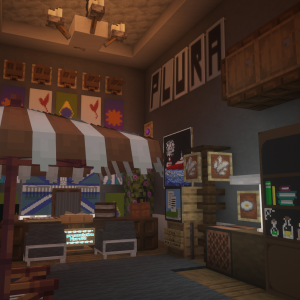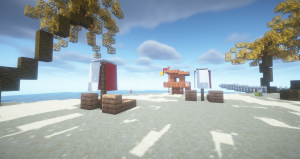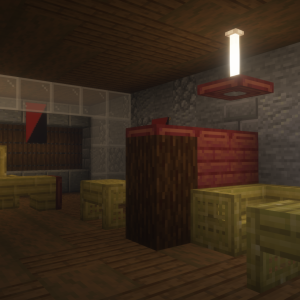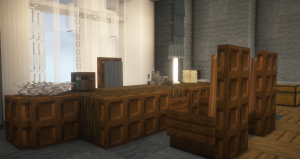In just two months, Anaphase Andy has risen as a figure of change in DemocracyCraft politics, consolidating significant power and building a robust support base in a remarkably short time. As the Chairman of Redmont for Equal Citizens (REC), a political action committee with bold ambitions, Andy is determined to challenge the entrenched status quo and reshape the dynamics of the server’s political landscape. Through his innovative strategies like creating a “ghost campaign” and lobbying divisive legislation, he has made himself a catalyst for change, something D.C. has not seen. In this insightful and candid interview, he unveils the successes from his rapid rise, the REC’s accomplishments, and his vision for a new political shift in D.C. politics.
ADVERTISEMENT
- Luka: “So to get started, I’d like to ask: why did you run a kind of a ghost campaign since you decided to ultimately drop out before the election started? What was the point, or what were you trying to get across for the DemocracyCraft players?”
- Luka: “So this is kind of to set a backdrop for your PAC and see how the limitations are set in democracy and in the current politics of DemocracyCraft? Is that what I’m getting at?”
- Luka: “What did you specifically learn that would help better your PAC in getting bills passed and getting the practical sense of getting the bills done and passed through Congress, you know, to actually achieve the goals?”
- Luka: “Could you go further into that bill?”
- Luka: “Right, and speaking to the fact that some parties currently—well, some party members more so—follow whatever the party leader says or the majority whip says, and then essentially turn their backs against the people? Is that what you’re kind of trying to say?”
- Luka: “What makes your REC PAC special in terms of policy and the organization itself?”
- Luka: “So, I’m kind of wondering, is there another organization that you are competing with, if there even is any, in DemocracyCraft?”
- Luka: “To Furthermore, tell us what more bills you guys have gotten through Congress?”
- Luka: “So you guys have been just doing executive orders as of right now? Mostly?”
- Luka: “Okay. So what are your long-term goals for this whole thing? Like, what kind of impact do you want to have on the server as a whole?”
Full Exclusive Interview:
Luka: “My name is Luka. I’m the Editor-in-Chief at The Reveille Times. Thank you so much for your time today and for taking time out of your busy schedule to have an interview with us. To kind of break the ice, if you could compare yourself with any other IRL politician, who would it be?“
Anaphase Andy: “Well, firstly, Luka, I want to thank you for having me, and I want to say what a great thing The Reveille Times is. I remember talking to you before about creating this and how you wanted to make something different. I hope you achieve that. And that’s also a fantastic question you have. You know, when I talk to people I work with, I often tell them that I prefer a Nixonian style. Loyalty is very important to me in politics. I like to get things done when they need to be done. I don’t like to dilly-dally on it. So I’d say Nixon or LBJ would be the two. Lyndon B. Johnson was also known as a great legislator, which I believe applies to me as well.”
Luka: “This relates to your hopes and aspirations for DemocracyCraft, which I can see because you’ve been really strongly emphasizing policy and legislation in DemocracyCraft.”
Luka: “So to get started, I’d like to ask: why did you run a kind of a ghost campaign since you decided to ultimately drop out before the election started? What was the point, or what were you trying to get across for the DemocracyCraft players?”
Anaphase Andy: “Well, first we need to start with the foundation that backed me. It was my foundation. I’m the chairman of Redmont for Equal Citizens. We’re a Political Action Committee and a consulting group that helps politicians, usually newer politicians, but could be established as well, in the parties. We help them really climb up the ladder in DC, with the goal of maintaining our policies and encouraging new and upcoming lawyers and politicians to come up through the ranks. So that’s very important to understand why we did this. Now, we actually did two things with this exercise. We ran a ghost campaign with me running for the House. And, we actually lobbied for a bill; it was called The Committee Restoration Act. It was an amendment of the LSA Cleanup Act. And what that bill would have done is it would have brought back committees. And we were very particular in choosing that policy. We chose a policy that we believed would be beneficial, but we also chose one that was purposefully divisive. We wanted to see how the politicians in the House, Executive, and really all over DC, would react. We wanted to see how parties would mobilize against it, and we wanted to see how parties would mobilize to support it.”
“As for the ghost campaign, we wanted to see how easy it was for a congressman to get support. We wanted to see how easy it was to get elected, and we wanted to see what it took to get elected. So really, this was an information-finding mission.”
Luka: “So this is kind of to set a backdrop for your PAC and see how the limitations are set in democracy and in the current politics of DemocracyCraft? Is that what I’m getting at?”
Anaphase Andy: “Yeah, we wanted… well, we wanted to see a couple of things. We wanted to see, first of all, how does a bill become law? Not necessarily in the legal sense, but in the practical sense. How does a congressman… well, how does anybody approach Congress with a policy? How difficult is it to get it done? In its most divisive state, at its most difficult, how difficult is it? We also wanted to see how the voters would react to certain bills, to certain actions, and to certain candidates. So really, this was a test run on how we can do our job better, and how we can represent our members better. We absolutely learned a lot about all the different parties. We learned about several different politicians. We learned the good and the bad. I think it’s going to be very useful.”
Luka: “What did you specifically learn that would help better your PAC in getting bills passed and getting the practical sense of getting the bills done and passed through Congress, you know, to actually achieve the goals?”
Anaphase Andy: “Well, let’s start off with this. We said this in our press release. By the end of the exercise, our bill would have passed. After we ended the exercise, we told the congressman who proposed it, ‘Hey, you’re free to withdraw it,’ because we got them to propose it. We ended up with six votes in the House, and our expected number in the Senate was four people in the Senate—four out of six. Now, this would have passed the bill. So it was a successful exercise. I’m just going to talk about the bill, the policy part for now.”
Luka: “Could you go further into that bill?”
Anaphase Andy: “Yeah. So basically what it did is, currently, congressional committees are gone, done, killed, and we got rid of it. All that bill would have done is it would have brought these committees back and it would have given a lot of power to the presiding officers: the Speaker and the President of the Senate. Bills could have died, could be killed in committees, or they could be improved tremendously in these committees. They would have provided a tool for different parties and for different caucuses to support and kill a bill, or to make sure that their congressmen are staying in the party line. The REC does want to increase the prevalence of the party leaders and majority whips in those kinds of positions. That’s what the committees would have done; that’s what that bill would have done. We got majority support in both chambers, but it was very difficult to do so. That tells us three things. One, at its most basic, it was a divisive bill, but we saw that through discussion. Two, we learned how easy it was to get the support of certain congressmen. We learned which congressmen are going to say, ‘Hey, let’s actually sit down and talk about this bill. What does this bill mean for my voters?’ And we also learned that some congressmen really don’t care. For some congressmen, you show them a bill, and if it looks good, they’re going to go, ‘Alright, looks good, send it through.’ They don’t really ask you any questions about it or any implications, and they don’t give you any suggestions. But what was most interesting to us, and what we’re going to have to address, is the prevalence of—I don’t know what else to call it, but—Tammany Hall. Are you aware of what Tammany Hall is, Luka?”
Luka: “No, I am not.”
Anaphase Andy: “Well, in the late 1800s and early 1900s, there was something called Tammany Hall in New York. It’s what you call a political machine, a corrupt system in which the wealthy and the corrupt could control the elections. Am I saying Congress is corrupt? No, not at all. We found no corruption throughout any of this process. We didn’t find anything like that. What we did find is that there were these kinds of ‘pit bosses’ of different groups of congressmen. Now, this is to be expected to a certain extent, but we found a representative who spearheaded the bill, who was behind it from the beginning. Then, their party leader came out and said, ‘We don’t like it, we’re going to kill it.’ And that Representative then stepped out. They said, ‘We’re not going to support it. In fact, we’re going to openly oppose it.'”
Luka: “Right, and speaking to the fact that some parties currently—well, some party members more so—follow whatever the party leader says or the majority whip says, and then essentially turn their backs against the people? Is that what you’re kind of trying to say?”
Anaphase Andy: “Yes, absolutely. We found that is absolutely a possibility. But there was also something very, very interesting. The same party that had these practices was also the only party we saw in which one of its members broke rank. Meaning, they came to us, our lobbyists, and well, at first, they said they were going to vote with their party. But after talking to one of our lobbyists, they said, ‘You know what, I’m going to vote against my party, I’m going to support your bill.’ And that was very interesting to us. What that suggests is that even if you are very strict with your party, that does not demand loyalty. That is not what is going to keep your people in line. If you want to keep your party in line, first of all, you need to support your members’ policies, you need to support your members, you need to get them elected, and you’ve got to openly communicate with them. You can’t be telling them what to do; you have to be communicating with them what to do. They need to be convinced, right? And that’s a good thing we found in the House, that every single one of those representatives that we spoke to—the ones that supported us—needed to be convinced. And we were very happy about that. All but one, I believe, needed to be convinced.”
Luka: “What makes your REC PAC special in terms of policy and the organization itself?”
Anaphase Andy: “We are a Political Action Committee and we fundraise, and we staff attorneys, lobbyists, pollsters, and our goal is to inform politicians, educate them, educate lawyers, inform them, and help them better do their jobs with the goal of achieving our policy. And for our policy… In order to achieve our goals, the REC works with all members of government. Now, that means across all parties. We form alliances with cooperative parties and groups. We lobby the government institutions and campaign for cooperative political candidates. We litigate and we do much more, like these types of interviews. We gain our funding from generous donations from the people of Redmont. Our policies include legal education and transparency for the public, the rectification of constitutional and legal errors within Redmont, a direct relationship between the people in Congress, and an inclusive, non-toxic DC.”
Anaphase Andy: “We will be expanding our organization into providing lobbying services. So, we can be hired by parties, by companies, by private individuals, and we will be lobbying the government for a fee. We will be doing that as one of the big announcements we’re very happy to make, given our recent successes. But as of now, our primary goal is to really stay within law and politics and policies thereof. Politicians can do whatever they want in the economy; we don’t really care about that. We care about policies regarding the law, politics, Congress, the House, Senate, and the Executive, and how the politics is done. And that’s one of our main goals: to change and improve how politics is done. Now, there are some parties that we are very, very concerned with. There are some parties that need improvement.”
Luka: “Like what? Which?”
Anaphase Andy: “Well, one of the big parties we’re very concerned with is the Redmont Reform Party. They’re actually, I think, they’re struggling to get registered with the Department of State. You could correct me on that, I’m not sure if they have yet, but recently they’ve been struggling to do it. Their policies have stood to increase the barrier to entry for new aspiring attorneys. It’s going to intimidate them. It’s going to make it much, much more difficult for people to become attorneys. It’s going to make it much more expensive. It’s against what the REC stands for, but I am very happy about it (because) I want to give somebody a shout-out: Endeavor. He has been talking with the REC about how to improve these policies. We made some great progress in those discussions and I do hope that you will publicly see here that we can achieve an agreement on that… But we’re very concerned about the Redmont Reform Party and we’re concerned about the PCR, but that’s for a different reason.”
Luka: “So, I’m kind of wondering, is there another organization that you are competing with, if there even is any, in DemocracyCraft?”
Anaphase Andy: “My knowledge is that we are the only political action committee. There is the Urban Development Alliance of Redmont. They have not grown, they haven’t fundraised, they haven’t really done much. They haven’t really advocated for anything. So as far as I can see, we are the only active political action committee. Actually, we’re also, I believe, the first political action committee.”
Luka: “To Furthermore, tell us what more bills you guys have gotten through Congress?”
Anaphase Andy: “Well, actually, our biggest progress has been the executive with the Sovereign Wealth Fund. That was something we were very proud of, but that’s not really our realm. What we are very proud of is the National Welfare Office. I don’t know if that’s been published yet, but that is an executive order in the works.”
Luka: “So you guys have been just doing executive orders as of right now? Mostly?”
Anaphase Andy: “Well, the President is our Vice Chairman, so that gives us a unique opportunity to work with him to craft very particular executive orders. And we have gotten a lot of progress done through that, through our Vice Chairman, who is the President.”
Luka: “Okay. So what are your long-term goals for this whole thing? Like, what kind of impact do you want to have on the server as a whole?”
Anaphase Andy: “I want to change how politics is done right now. And some of that I really don’t like: congressmen are getting elected with one vote. There are congressmen in the House right now who were elected with one vote and they have not spoken a word since. That is something that needs to change. That’s number one. So we need to rally voters and we need to organize our voters. That’s number one. Number two, the parties in the House, they don’t know how to whip their own votes. They don’t know how to keep their people in line, but at the same time, there are pit bosses who are controlling these votes. And that is, first of all… That is contradictory, right? But the problem is there are these big groups who control Congress, but there are leaks. There’s leaks in the pipes and people are coming through. They’re breaking rank. They’re voting against their parties. And you’ve got to go one way or the other. What the REC wanted with our exercise is to what extent do these parties really have control? And to what extent can they gain control? And which way are they trending? But one thing that we also see is the amount of independent candidates. Currently, the independents have the majority. The majority of the people in Congress are not registered with a party. And that is something we definitely want to look into because that tells us two things. That tells us, one, that the voters really aren’t looking at the parties when they’re electing their representatives. They really don’t care. That’s number one. And number two, that tells us that there is a huge group of both voters and congressmen who are essentially free agents, who are up for the taking, and we need to ask ourselves a question. How and why has nobody taken these guys up? Why are they still free agents? Because if you achieve a majority of the independents, you take Congress. And that is going to be our goal. Because if you want to work with the REC, you don’t need to register with us because we’re not a party. You can work with the REC and still be a member of another party and still be an independent. Whoever takes control of the majority of the independents, takes Congress. And that is what we’re going to be looking at to get our policies passed.”
Luka: “Thank you so much, Anaphase Andy. Thank you so much for your time today to do this interview.”
Anaphase Andy: “Thank you so much for having me.”









